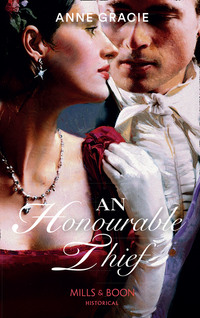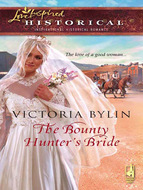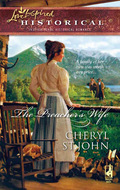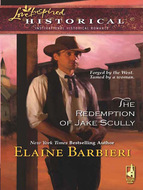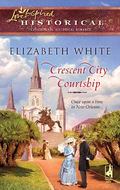Buch lesen: "An Honourable Thief"
Mr. Devenish danced her across the room in a dazzling display of virtuosity and masculine energy,
twirling her and twirling her until she was quite dizzy with pleasure and delight.
Kit had danced the waltz several times before, but she suddenly realized why it had been regarded as so scandalous. When danced like this, caught up hard in the grip of a strong masterful man, twirling in his arms until you lost awareness of anything except the music and the man, the experience was utterly intoxicating.
Kit simply gave herself up to the magic of the dance. And the man. The world blurred around her in a glittering rainbow, the music spun through her brain in a melody of magic, and all that anchored her to the ground was the hard, strong body of a tall dark man.
Praise for Anne Gracie’s recent titles
RITA® Award Nominated
Gallant Waif
“Ms. Gracie has a knack for delving into people’s souls and tickling their funny bone.”
—Rendezvous
“An easy and elegant style…this is as polished a piece of romance writing as anyone could want.”
—The Romance Reader Web site
Tallie’s Knight
“Charming and wonderful…”
—All About Romance Web site
#615 THE TEXAN
Carolyn Davidson
#617 A WILD JUSTICE
Gail Ranstrom
#618 THE BRIDE’S REVENGE
Anne Avery
An Honorable Thief
Anne Gracie

MILLS & BOON
Before you start reading, why not sign up?
Thank you for downloading this Mills & Boon book. If you want to hear about exclusive discounts, special offers and competitions, sign up to our email newsletter today!
Or simply visit
Mills & Boon emails are completely free to receive and you can unsubscribe at any time via the link in any email we send you.
Available from Harlequin Historicals and
ANNE GRACIE
Gallant Waif #557
An Honorable Thief #616
Contents
Prologue
Chapter One
Chapter Two
Chapter Three
Chapter Four
Chapter Five
Chapter Six
Chapter Seven
Chapter Eight
Chapter Nine
Chapter Ten
Chapter Eleven
Chapter Twelve
Chapter Thirteen
Prologue
Near Batavia, on the island of Java, Dutch East Indies. 1815
“Promise!” The dying man grabbed her arm in a hard-fingered grip. Promise me, damn you, girl!
Kit Smith winced under the pressure. She glanced down at her father’s thin, elegant fingers biting into her flesh. Gentleman’s fingers. White, soft, aristocratic, seeming too fine even for the heavy ring he wore. Refined hands, good for lifting a lady’s hand to be kissed. For gesturing in an amusing fashion to illustrate a sophisticated story. White-skinned, blue-veined hands. Hands which had never done a hard day’s labour in their life. Hands which excelled at the shuffling and dealing of cards…the clever, extremely discreet dealing of cards…
Kit bit her lip and tried to ease her arm from under the punishing grip. He did not know his own strength, that was Papa’s trouble.
People didn’t when they were dying.
“Promise me!”
Kit said nothing. With her other hand she picked up a linen cloth and wiped a trickle of blood from the corner of his mouth.
“Dammit, girl, I want that promise!” He searched her face angrily. “It’s not as if I’m asking you to do anything you haven’t done a hundred times or more in your life!”
Kit gently shook her head. “I cannot, Papa.”
He flung her hand aside in disgust. “Bah! I don’t know why I bothered even asking you. My daughter!” The scorn in his voice lanced through Kit. “My only living child! She, who has refused to help her father since she turned thirteen!”
“Hush, Papa, do not try to talk. Save your strength.”
“Be damned to it…I’m dying, girl…and I’ll not…be hushed. By sunset tonight—” He spat blood and lay gasping for breath before he could continue. “Dying, curse it…and without a son to…” He rolled his head away from her, muttering, “Nothing but a daughter, a useless daughter—”
Kit did not respond; she told herself she was inured to the pain of his tirade on the uselessness of daughters. She’d heard it all her life.
Her maidservant and companion, Maggie Bone, bustled in, carrying a pile of clean linen and a bowl of fresh water. Kit nodded her thanks and, as Maggie removed the blood-soaked wad of linen, Kit pressed a fresh pad against the wound in his chest.
“Done for, curse it.” He gave a snort of bitter laughter. “And by some clod of a colonial lout! Me! In whom the finest English blood flows…”
Kit pressed harder, willing the flow to stop.
“Not so hard, girl!”
Kit eased the pressure slightly. In moments fresh, bright blood seeped through it. Her father’s life blood, draining inexorably away into a napkin.
“Blasted stiff-necked Dutchman. Accusing me of cheating! Me! The Honourable J—” He broke off in a paroxysm of coughing.
“Hush, Papa, you will only make it worse if you try to speak. And besides, you are not the Honourable Jeremy Smythe-Parker here. That was in New South Wales. The name you are using now is Sir Humphrey Weatherby, remember?”
Not that it mattered any longer, she reflected. The Dutch doctor had left, the Javanese servants could not understand English and Maggie’s loyalty was unquestioned. There was nobody to pretend to any more. But one could not break the habits of a lifetime so easily, and keeping track of her father’s many identities was such a habit.
Her father ignored her. He lay gasping for breath for another moment of two. “Felled by a grubby tradesman, in a dirty foreign village in the middle of nowhere. If the blasted Pittance hadn’t been late—”
The Pittance was what he called the money which arrived so mysteriously from time to time. It seemed to come, no matter where they were, though it was often late. Kit had no idea where it came from, or why. Her father refused to discuss it.
She glanced through the window at the sea sparkling under the sunlight. It was so blue it almost hurt her eyes. To be sure, there were the swamps and the mosquitoes were very bad—malaria was a serious risk—but on some days, Kit had thought they had landed in paradise.
Yet in her father’s eyes, everywhere they had ever lived, no matter how wonderfully exotic or beautiful, had soon been declared grubby or obscure or provincial. Nothing compared with England.
He was, he had always been, a most bitter exile.
Kit reached for a fresh pad of linen. He was growing paler by the moment.
Her father coughed painfully. “Dammit…why could not Mary have given me a son who lived…sons…”
She tried not to listen. She pressed the linen pad more firmly against his wound. Was it her imagination, or was the blood flow slowing?
“A son would understand about a man’s honour.”
“I understand honour very well, Papa,” said Kit. “Even if I am only a girl.” If her father was unaware of the irony of a card cheat and swindler lecturing his daughter on honour, Kit was not. But it was not the card game or the recent duel with the Dutchman he was referring to. No, it was about what had happened in England all those years ago.
“Don’t take that tone with me, girl! If you understood anything at all about a man’s honour, you would make me that promise.” He lay back, wheezing with the effort of his outburst. “Females have no understanding of honour. Their minds are too clouded with emotion…If only my bonny boy had lived.”
Her mother had died giving birth to a little stillborn brother when Kit was six, but her father still spoke of her brother as if he was a person he had known and loved.
“If only he had not died. Now…” He looked at her with bitter grief. “My son would not let me die refusing to promise to avenge the great wrong done me.”
There was a long silence. All that could be heard in the room were the far distant noises of life going on outside the cottage: the chattering of monkeys in the jungle behind the house, the laughter of children in the nearby village, the squawking of a chicken.
And inside the cottage the sound of laboured breathing.
Not for the first time, Kit wondered about what had happened back in England, before she had even been born. He had always been bitter about it, and yet uncharacteristically silent about the details. He’d always vowed revenge, but on whom and for what, she’d never known.
Whatever it was, it had never stopped festering in him.
If it hadn’t happened, he’d said over and over—generally when he’d been drinking—he would be a rich man, respected, living in a beautiful big house in England. His beloved England.
She’d never quite believed it. But now she wondered. Had she been too quick to dismiss it as another one of Papa’s fantasies?
Had that—whatever it was—truly been the cause of her father living the sort of life he had? Drifting from one place to the next. Living from card game to card game. Arriving in obscure corners of the far-flung empire as Sir Humphrey This or The Honourable Mr That; leaving as a reviled card cheat and scoundrel…as they had just a few weeks ago from Sydney Town in the colony of New South Wales. An ignominious exit, tossed on the first outgoing ship…arriving in the Dutch colony of Batavia.
If the Great Wrong—as he put it—had not been done to him, would he have lived as a decent, contented man in England?
She would never know. But he was her father. She ought to give him the benefit of the doubt.
Kit bit her lip. He was her only living relative. And he was dying. Who was she to deny him peace on his deathbed? Her scruples suddenly looked a little like selfishness to her.
She looked down at him. His face was grey, his lips had an ominous tinge of blue. His eyes were closed, but he was not asleep—the tension in his body testified to that.
He looked like a man drained of all hope.
All her life Papa had always had a new scheme, a new horizon, plans…
Who was she to say no to a dying man’s last wish?
Kit sighed. She leaned forward and took his hand gently in hers. “I will do what a son would, Papa. I will retrieve your honour for you. Tell me what I must do.”
The heavy-lidded eyes opened, wary at first, then suddenly sharp with triumph. The long-fingered hand tightened convulsively and painfully as he pulled his daughter closer to whisper the instructions in her ear.
At last he finished, closed his eyes in exhaustion and sank back against the pillows.
The heat of the afternoon pressed on them. A hot moist wind lazily stirred the leaves in the trees outside. The only other sound was that of a man fighting for every breath.
Suddenly he opened his eyes. “Sent a letter to Rose from Sydney Town. Told her—” He choked suddenly and went into a long paroxysm of coughing.
He subsided shaken, grey and immeasurably weaker. Kit wiped his face with a cool, damp cloth and wondered who this Rose was.
“Hush now, Papa, do not worry yourself. I will do what is necessary. Just lie still and try to save your strength.”
A ghastly smile settled on his lips. “My son…” he muttered, so low, Kit could hardly hear him. “My beloved son…”
And with that, her father died. On a low pallet in a simple Javanese cottage on the other side of the world from where he belonged. Killed in a duel for cheating at cards. The final blow in a life that, according to him, had contained nothing but blows.
He died without a word of love or farewell to his only child, his daughter, the companion of his exile for the whole nineteen years of her life.
“Never mind, Miss Kit,” said Maggie Bone comfortingly. “He did value you, really. Some men never can say how they feel.”
Kit accepted the lie with a nod and a tremulous smile. “I know, Maggie.”
“I wish you’d never promised him, though.”
“Yes, but I did, so there’s no going back on it now.”
Maggie sighed. “London, is it?”
“Yes, London. To stay with someone called Rose.”
Chapter One
London 1816
Mr Hugo Devenish made his way through the quiet streets of London, his eyes on the faint, unnatural glow in the sky over the city. Gaslights. Twenty-six miles of gas mains had been laid around London, he had heard recently. Everyone was rushing to install the new miracle.
Sultan’s hooves clattered and echoed on cobbled stones. Hugo leaned forward and patted his mount on the neck. He’d carried his master gallantly for a long distance. Horse and master were pleasantly weary.
He passed the homes of several acquaintances and cast a casual eye over the dark and silent buildings.
Suddenly he stiffened. A shadow moved out of one of the tall mullioned windows on to a small balcony jutting from an upper storey of a large grey mansion nearby. There was something furtive, stealthy in the movement that attracted Hugo’s attention. He reined Sultan to a silent halt.
It was Pennington House, the home of Lord and Lady Pennington. Hugo knew the family slightly: Lord Pennington was a member of the Government, a stern, slightly pompous man in his early sixties; Lady Pennington was a prominent member of society. Their son, Hugo believed, was an intimate of his nephew, Thomas.
Shadowy figures ought not to be appearing from darkened windows of the homes of Government members at three in the morning, thought Hugo. This could well be a matter of national security. The war was over, but that did not mean there were no more Government secrets to be stolen and sold. There were always secrets.
Hugo watched intently, his eyes squinted against the glow thrown out by the gas lamp in front of the house. He cursed it silently. The bright glare made it very difficult to make out the figure behind the lamp—all he could see was a silhouette.
As he watched, the figure climbed on to the carved stone balustrade, paused for a moment and then leapt out into the air. Hugo’s breath caught—the thief would surely plummet to his death—but no. He clung to the next balcony like a monkey and climbed up. He was an agile little devil, thought Hugo.
He ought to go and rouse the household, to pound on the front door until someone came. But by that time, the thief would be gone. No, he would try to catch the scoundrel himself.
He watched as the miscreant shimmied skilfully up one of the shallow carved columns which graced the front of the house—not at all an easy task, as a man who had spent his boyhood climbing around the upper reaches of ships and masts well knew. He admired the agility and skill of the rascal, even as he resolved to foil him.
The thief clambered onto a low roof and disappeared around a corner. Hugo followed, wincing at the slight clatter that Sultans hooves made on the cobbles. He hesitated, then slipped off his horse, tied him to a nearby lamp-post and ran into the narrow alleyway which bordered the house.
It was difficult to see the scoundrel. There was only the occasional flickering of movement against the grey stone of the house, the faint scrap of a foot on a slate tile. Then a shadow moved swiftly and lightly along the roof that ran along the back part of the house and for a moment, the scoundrel’s silhouette was clearly visible in the soft golden glow the gas lanterns cast against the night sky.
Hugo frowned at the silhouette; it was strange and yet somehow familiar. The intruder wore loose baggy clothing, shapeless pants and a baggy tunic. He wore some sort of cap on his head, and something flapped against his back. An elusive thread of memory twitched in Hugo’s mind, but he was entirely focussed on the thief’s actions and did not pursue the thought.
The thief leapt lightly off the roof and landed cat-footed, on all fours, balanced on the high stone wall which surrounded Pennington House. He swung his legs over the wall and prepared to drop down.
Hugo raced to intercept him. Just as the thief hit the ground, he threw himself forward in a tackle, catching the thief around the legs.
“Aiee-ya!” The thief kicked out, hard, breaking Hugo’s hold.
“Oof!” Hugo, winded, but determined, grabbed again at the intruder. They rolled on the filthy cobblestones and as he clutched at the loose baggy clothing, he caught a whiff of a scent: strong, foreign, familiar.
The thief was wearing a black skull-cap pulled down over his head and dark muffler wrapped around the lower part of his face. All Hugo could see were his eyes, glinting fiercely in the gaslight. He caught hold of a skinny arm and—
“Aiee-ya!” It was as if a blunt axe had landed on his wrist. Hugo swore and let go, and in a flash the thief pulled free, rolled away from him on the cobblestones and raced swiftly along the alley. A long black pigtail bounced lightly against his back as he ran.
Hugo scrambled to his feet and gave chase.
As he rounded a corner there was a flurry of hooves. He threw himself against a wall as a brown horse bore down on him, a small figure clinging nimbly to its back. Horse and rider passed under the gaslight and Hugo gasped in surprise.
The thief was a Chinaman. The cry he had used was peculiarly Chinese. Hugo had heard coolies use it abroad. He’d not expected to hear it in London. And the clothes were unmistakable—the typical loose baggy dark indigo pants and tunic, a round black embroidered cap and most obvious of all, the long black pigtail hanging down the length of the thief’s back, bouncing and flying as the horse rounded a corner and disappeared.
Of course! No wonder the silhouette had looked odd and yet familiar. And that was where he’d smelt that scent before—in a Chinese joss house! It was some kind of incense, sandalwood perhaps.
But good God! What would a Chinaman want with the secrets of an English Government member?
Panting slightly, rubbing his sore wrist and feeling rather foolish for having been bested by a man so much smaller and lighter than himself, Hugo limped back to the front door of Pennington House and braced himself to rouse the household.
He glanced up at the gas lamps at the front of the house. They were supposed to reduce crime in London; all they’d done was make it more difficult for him. The scarf had hidden most of the rascal’s face, but those damned gas-lamps distorted everything. He’d caught a glimpse of the thief’s eyes—but in them he’d seen only the reflected blue flames of the gaslight and whoever had heard of a blue-eyed Chinaman!
He gripped the knocker and pounded on the Penningtons’ front door.
“Miserable blinkin’ weather. I’d forgotten about the miserable blinkin’ weather. That’s London for you!”
Kit glanced at the sour countenance of her maid, who was peering gloomily out of the window.
“Rain, rain all the blinkin’ time—and then, when it does finally stop, what do you get?—blinkin’ fog! However did I stand it when I was young?”
Kit tried not to smile. “Never mind, Maggie dear, we need not stay here forever, you know.”
Maggie snorted and picked up the woollen stocking she had been darning. “You can’t gull me, Miss Mischief. You’ve always hankered after a home of your own, and now we’re finally home in England—”
“But that’s just it, Maggie,” Kit interrupted, frowning. “I’m not home. I wasn’t even born in England. I don’t belong here, any more than—”
“What do you mean, you’re not home? O’ course you’re home!”
Kit smiled a little ruefully. “No. I’m not. I have no family here—no family anywhere. I’m living amongst strangers here, just as I always have.”
“Nonsense! No family? What about your auntie? Miss Rose is—”
Kit blinked in surprise. “Maggie, I thought you realised.”
Maggie frowned. “Realised what?”
Kit pulled a wry face. “Rose is no aunt of mine. Papa had no kin. She is—or was—one of Papa’s friends. You’ve met a dozen of my ‘aunts’ before.”
Maggie frowned. “I dunno, Miss Kit, Miss Rose doesn’t seem like one of those types. Your pa was always interested in more, more…”
Kit smiled. “More glamorous females? Yes, but it has been more than twenty years since he last saw Rose. Much can change in that time and Rose may well have been quite a dasher in her youth—”
Maggie stopped her with an emphatic gesture. “We’ll not discuss your pa and his hussies. Scandalous, it was!” She lifted a long white frock in delicate muslin and carefully laid it on the bed. Come on, missie, let’s have you into this.” Tossing the gown over Kit’s freshly coiffed head, she turned her around, twitching the fabric into place, examining every inch of her critically. Her eyes softened at the sight of the young woman’s flushed cheeks and sparkling eyes.
“You’re enjoying this, ain’t you, Miss Kit?”
Kit blushed and looked a little self-conscious. “Yes, Maggie. I never dreamed it would be such fun to be a young girl again. To have nothing more to worry about than what to wear and who to dance with. And Miss Singleton is so very kind. I do not care what she may have done in the past, I have not experienced such kindness in…” She sighed, shook her head and drew on her gloves briskly. “Yes. It is very agreeable.”
Maggie looked at her searchingly. “You don’t think you might like to take the opportunity to get yourself a husband, lovie?”
Kit shook her head firmly. “It’s not what I came here to do.”
“Yes, but—”
“No, Maggie. I am here under false pretences. I couldn’t possibly deceive any man into offering for me. It is one thing for a man to offer for Miss Singleton’s poverty-stricken long-lost niece—though money seems to be so important here that I cannot imagine anyone doing such a thing. But to offer for a poverty-stricken unknown adventuress daughter of Miss Singleton’s former—” She broke off hurriedly. “Well! That’s a very different matter, at any rate. Any man knowing my true background is more likely to offer me a carte blanche than a ring, and you know I wouldn’t accept that.”
“I should hope not, indeed!”
Kit laughed. “Yes, Maggie dearest, your stuffy strait-lacing has certainly rubbed off on me.” She caught Maggie’s look and amended her statement. “Well, in most areas, at least. I cannot be expected to have inherited nothing at all from Papa, now can I?” She planted a light kiss on her maid’s rosy cheek.
Maggie bridled in pleased disapproval. “Oh, get away with you, Miss Baggage! I don’t approve and you know it—and I hope I know better than to try to change your mind after all these years, so dratted stubborn you can be—but you do know they hang people here, Miss Kit. Or transport them.”
“Yes, and they chopped people’s heads and hands off in China, but I still have both my bits, don’t I?” said Kit. “You need not worry,” she added soothingly. “It is only a small commission from Papa, and not at all dangerous.”
Maggie snorted. “Don’t try to gammon me, Miss Kit. I wish you’d just forget whatever it is your pa asked you to do. He never was careful enough of your welfare. Can you not forget all that nonsense now His Nibs has passed on?”
“Nonsense? Family honour is not nonsense,” said Kit. “In any case,” she added hurriedly, having almost forgotten her resolve to keep Maggie ignorant of her doings, “I have no idea what you are talking about. I am merely preparing to attend a ball. Now—”
Maggie sniffed. “Won’t break a promise, will you? And he knew it, drat the man!” she added under her breath. “I’ll say no more, for I was never one to waste breath in trying to change what can’t be changed.”
“Yes, and we must hurry, or I shall be late for this ball. Now, where is that shawl, the embroidered gauze one? I have a mind it will go perfectly with this gown.”
Grumbling under her breath, Maggie fetched the embroidered white-on-white gauze shawl and draped it carefully around her mistress’s shoulders. She stood back, examined Kit with a critical eye, and sighed heavily. “Aye, ’tis bonny you look, right enough, though I wish you’d wear something other than white. It does bring out that dratted brown colour in your skin.”
Kit laughed. “Oh, pooh! I am no longer brown at all—in fact, I think I look sadly pale. But there, that is the fashion, I suppose. And my gown must be white, dearest Maggie. I am supposed to be a girl just emerged from the schoolroom—naturally I must wear white.”
She ignored the maid’s snort and searchingly examined her face in the looking glass. “I do look like a young girl, do I not, Maggie? My twenty years do not show too much, do they?”
“No, Miss Kit. T’aint natural,” the maid said gloomily. “You look barely eighteen—even younger when you smile.”
“Good,” said her mistress briskly. “I must remember to smile more often then. Now hand me my cloak, if you please, or I will keep this new ‘aunt’ of mine waiting in the hallway, and that would never do.”
Kit hurried down the stairs. She found Aunt Rose patiently waiting in the hallway below.
“Ah, there you are, dear,” called Rose. “I hope that cloak you are wearing is warmer than it looks. The evening is chillier than I expected and, you know, that mausoleum of Fanny Parsons’s is as cold as a tomb, and she never heats it properly. I blame that husband of hers,” she added darkly. “The Parsons have always been shocking pinch-pennies, but he is by far the worst of them. I have had to put on three petticoats—three!—and I am sure I shall still catch a chill.” She shivered and hugged a slightly tatty fur cloak around her.
Kit could not help smiling down at the middle-aged woman as she descended the stairs. It was a little cool, but to hear her speak, one would think it about to snow.
“Aunt Rose’ was slender, almost wraithlike, with a pale, faded sort of prettiness about her—rather different to the bold good looks her father had favoured in women. And, far from being fashionable, she was generally dressed rather dowdily and, being so susceptible to drafts, always with a great many scarves and shawls trailing about her person.
And yet, despite the faded looks, despite the dowdy clothes and the vagueness, there was a definite sort of something about Rose Singleton, a certain unconscious air of ton that even the best looking and most fashionably dressed of her father’s other female friends had lacked.
Kit supposed that this was why her father had chosen to send her to Rose Singleton instead of anyone else. The surprise was that Miss Singleton had agreed to take her. In fact, she must still have harboured some warm feeling towards Kit’s father, for she had embraced Kit on her arrival in England quite as if she really were her long-lost niece.
“Ah, you are wearing pearls, my love. Very suitable,” said Rose. “I must remember to compliment your maid. So many girls in your position would be quite unable to resist the temptation to drape themselves with stones until they look exactly like a chandelier and I do so think diamonds are unsuited to a young girl. Pretty, of course, but so hard. Pearls, now, are much more suitable for an ingenue.’
“Diamonds, Aunt? There is no danger of me wearing diamonds, I assure you!” Kit could not help the choke of laughter that escaped her. Diamonds! It had been as much as Kit could manage to purchase one set of good quality fake pearls before her arrival in England. Diamonds, even paste ones, were beyond her budget.
Miss Singleton looked her over approvingly. “Yes, my dear. Very wise of you. One would not wish to appear vulgar.”
“No, Aunt Rose,” said Kit demurely. What on earth did she mean, girls in your position? A vague allusion to her imposture? If so, it would be a first. Rose Singleton could be quite determinedly vague at times, particularly when it came to avoiding subjects she did not wish to discuss. But she had been so kind and generous, Kit would not for the world distress her by referring to anything the lady wished to avoid.
She assisted the footmen to hand Rose into the coach, tuck a fur rug around her and adjust the heated bricks under her feet and then sat back, agreeably warm herself, while the coach rumbled over the cobblestones. She had learned to enjoy small pleasures while she had them.
Outside, the night was clear and bright. The coach pulled up outside the Parsonses’ town house, a grand old building, a little on the fantastical side and much embellished with Corinthian columns and odd Gothic gargoyles. It was lit, not only by gas lamps, but by flaming brands held aloft by liveried men.
Kit stepped from the coach and turned to assist Rose down. She felt a thrill of pleasure and anticipation. Tonight she would not think of anything except the ball. Tonight she would let herself be the carefree young girl everyone thought her and enjoy all the pleasures London society had to offer.
No doubt she would pay for it later, but then, that was life.
“Is this not delightful?” whispered a young girl sitting next to Kit. “I never thought there would be so many people. I have never been to a ball in London before,” she added confidingly.
Kit smiled. “Yes, it is quite new to me also.”
“Are not the ladies’ gowns beautiful?”
“Yes, very,” Kit agreed. “So many beautiful colours.”
“Kit, my dear, here is Lord Norwood, wishing to be allowed to dance with you. Give him your card, my dear,” said Rose, smiling meaningfully at Kit.
Thomas, Lord Norwood, bowed punctiliously over her hand. His fair hair was elaborately pomaded and carefully coaxed into the “Nonpareil’ style. He wore knee breeches of a nice shade of biscuit, a heavily embroidered waistcoat and a coat which fitted tightly across narrow shoulders; his shirt points were so high and so heavily starched he could barely turn his head. His neckcloth was a complicated affair involving several knots and loops. Added to this was a collection of fobs, pins and a quizzing glass. All in all, Lord Norwood appeared the very epitome of a dandy.
Die kostenlose Leseprobe ist beendet.
